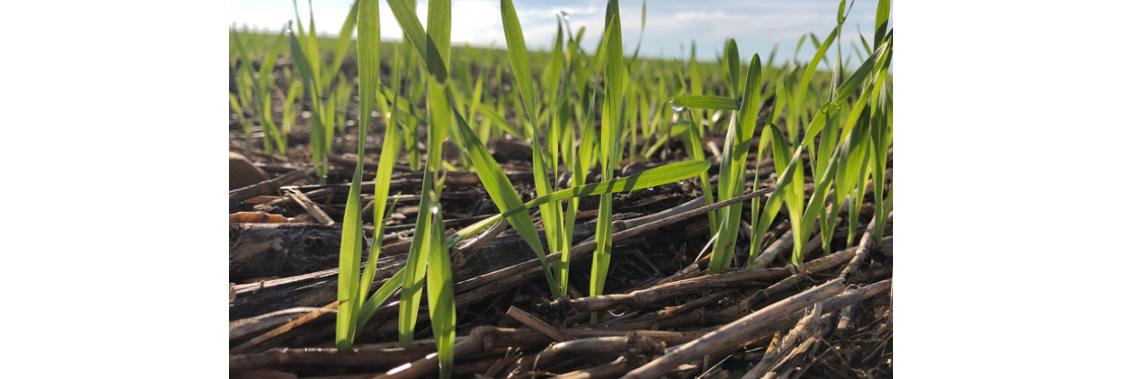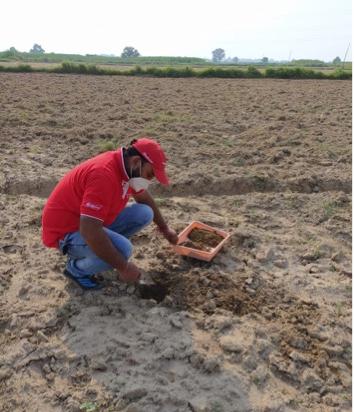From the Ground Up: How Soil Health Practices Can Help Farmers and the Planet
This year, we celebrate World Soil Day amidst a global pandemic that’s testing the resilience of communities around the world. On top of that, we have all witnessed firsthand the impacts of climate change and biodiversity loss, underscoring the importance of healthy ecosystems in transforming food systems. Advancements in agriculture over the past century have enabled farmers to feed a growing population, yet common row crop farming practices have inadvertently weakened soil health and increased nutrient runoff. By 2050, global agriculture production will need to increase by 60 percent to meet the demands of more than 9 billion people. Producing more on degraded lands will be impossible, unless we act now on solutions that will benefit our communities and our people.
As a global brewer, we depend on high-quality agricultural crops from thriving communities to brew our beers. Soil health is important for many reasons: it helps farmers improve productivity, protects water resources, and mitigates the impact of climate change. We are investing in soil health to help our farmers from around the world thrive – from their productivity to their efficient use of natural resources. But we cannot do it on our own.
Partnering for a better world
We have worked with The Nature Conservancy (TNC) for many years as a global partner in water. Our work together has furthered green infrastructure initiatives, conservation and reforestation projects, habitat restoration efforts, and improved water infrastructure to achieve measurable impact at scale. In July 2020, we expanded our work with TNC and launched a partnership in agriculture.
Our agronomists and researchers from around the world have been collaborating with TNC to develop a framework for designing impactful soil health programs. Teams are working to identify, encourage, and measure the practices that improve soil health locally and make farmers more economically and environmentally resilient over time. Practices are tied to key principles of soil health, including soil fertility management, minimal tillage, crop rotation, continuous cover, and regenerative landscapes. Our approach is unique, as it:
- Leverages our direct connection to farmers to drive practice changes and impact
- Remains flexible across the spectrum of our farmer sizes, crops, and sourcing regions
- Builds on our Smart Agriculture goal, to transform data into insights and technical support that advance best, sustainable farming practices
Local teams making a global impact
We believe research, knowledge, technology and financing are the key to transforming agriculture at scale. With the framework as a guide, our local teams are poised to develop effective ways to deliver soil health recommendations to farmers by offering technical support, sharing performance benchmarks, facilitating peer-to-peer networks, and building strategic partnerships to help incentivize adoption across contexts. Our partners at the Sustainable Food Lab are helping us harmonize the way we measure the impact of and capture the learnings from our programs and scale the adoption of practices that improve our farmers’ resilience globally.
Refining soil health practices in South Africa
In the Western Cape of South Africa, our team manages a model farm in Caledon to research and demonstrate innovative agricultural practices. Droughts are common in the region, especially during critical crop growth stages. Maintaining soil moisture is essential for producing high yielding, quality crops.
The team set out to produce more crops with less water, introducing minimum tillage practices on the farm. They soon saw that minimizing the extent and frequency of soil disturbance not only conserved soil moisture, but also improved soil structure and protected it against erosion. After five years, yields started to increase. Galvanized by these impacts, the team began adopting additional practices to improve soil health, including introducing cover crops to increase soil carbon – especially on marginal land – and replacing synthetic fertilizers with organic ones to speed up the process of building soil organic matter.
With these soil health practices refined and proven from the Caledon farm, the team is currently working to extend them to our farmers in the Western Cape.
Developing a regenerative system in Argentina
Our barley farmers in Buenos Aires province, Argentina, are increasingly strained by degrading soil quality, difficult weed management, and high input costs. Some farmers realize that improved soil health practices can mitigate these issues through improvements in crop performance, as well as reduced input costs; however, there currently is insufficient local analysis and advisory to support and scale practice changes.
We are now partnering with early adopter farmers as well as technical experts Instituto Nacional de Tecnología Agropecuaria (INTA) and Soil Capital to demonstrate that improved soil health practices and farm productivity go hand in hand. Alongside our agronomist team, INTA is training our early adopter farmers on soil health practices, developing farm transition strategies, and producing localized technical protocols. In conjunction, Soil Capital is using its digital farm diagnostic and benchmarking tool, mySoilCapital, to analyze farm economic and environmental performance and train these farmers on the connection between soil health and profitability.
We plan to partner with additional early adopter farmers over the next few years, while also facilitating peer-to-peer networking to amplify the successes and learnings of participating farmers in the interim, as farmers often learn best from one another.
Improving access to soil testing in India
In India, our barley farmers can face low crop productivity as a result of soil quality issues, such as low soil organic carbon and salinization. Soil testing is critical to farmers understanding and improving the quality of their soils, but testing is underutilized and results from some testing methods can be spurious.
Our agronomist team is working with farmers to demonstrate the importance of and improve access to soil testing – the team collects soil samples, sends samples to labs for analysis, and tailors farmer recommendations in light of these results. With soil test results, the team builds nutrient management plans and crop rotations – important soil health practices.
As we look ahead, our agronomists will continue to expand the number of farmers in the soil testing program. With increased soil data collection, the team is eager to demonstrate and share the connection between soil health practices and barley yield and quality.
On World Soil Day, we are committed to doing our part in creating healthier environments through sustainable agriculture. Together we can improve soil health and build thriving communities for the next 100 years and beyond.



